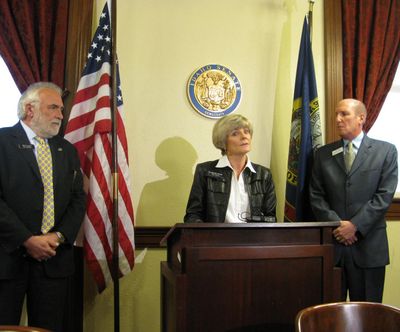A rare moment of bipartisanship on Idaho school reform

BOISE – In a rare moment of bipartisanship on school reform in Idaho, Democratic state lawmakers unveiled four far-reaching bills Wednesday, and GOP state schools Superintendent Tom Luna endorsed them.
“This isn’t a partisan issue,” said Sen. Elliot Werk, D-Boise. “We all know that we need to work together. The public expects us to work together.”
Within hours, GOP Gov. Butch Otter and House Speaker Scott Bedke, R-Oakley, also had encouraging words about the Democrats’ bills, which would enact into law the 20 recommendations from a task force that Otter appointed to chart the future of education reform in Idaho. Those items range from restoring $82 million a year in operational funds cut from the schools in recent years’ budget cuts, to new ways to determine when students should advance to the next grade.
Luna said, “This is a huge step forward, as it creates the bipartisan support for education reform that we’ve wanted, but it’s been elusive.”
Luna’s “Students Come First” school reform laws, which included rolling back teachers’ collective bargaining rights and a new focus on online learning, passed the Legislature without a single Democratic vote; voters resoundingly rejected the laws in the 2012 election.
Otter, who had backed the rejected laws, then appointed a 31-member task force drawing from all sides in the education reform debate, and it proposed the 20 recommendations, which backers are now calling a “strategic plan” for the future of education in Idaho. Among them are a teacher career ladder that would bring big pay increases along with a new tiered licensing program, and stepping up classroom technology, teacher mentoring and training, advanced opportunities for students and more.
The price tag for the full reform plan is estimated at $350 million a year, but Otter said Wednesday he plans to propose phasing the reforms in over five years. “I’m going to be as aggressive as I can, but it’s going to take five years, I believe,” he said.
Rep. Grant Burgoyne, D-Boise, said, “This legislation does not set timetables. It says these are the goals that the state of Idaho seeks to achieve. It gives specific authorization for rule-making. It directs, in some cases, that the germane people return to us for proposed legislation for specific implementation.”
Rep. Janie Ward-Engleking, D-Boise, a longtime teacher who served on the governor’s task force, said, “What resulted from this group’s efforts was a bipartisan set of recommendations. I know what kind of research, compromise and collaboration went into the recommendations.”
She said, “Our bills provide a framework to implement these recommendations. We certainly know we can’t do everything totally in one year, but we can put that framework in place and begin.”
The four bills address the 20 recommendations with one exception: The one endorsing the Idaho Core Standards, the state’s version of Common Core standards for student achievement. That was left out because the Legislature already approved that in 2011.
The bills were drafted by a group of Democratic state representatives, but they consulted with many others, including Luna, who said he met with the Democrats several times. “We’re open to all suggestions,” Burgoyne said. “We’re open to anybody else that’s got bills. We’d like to talk with them. When this process is finished, we’d like to have a consensus piece of legislation that is going to pass the House and the Senate and be signed by the governor.”
Bedke said he was “encouraged” by the new bipartisan push to enact the task force plan. “Over time, I think we can do that,” he said. “And I think everybody’s pretty committed to that.”